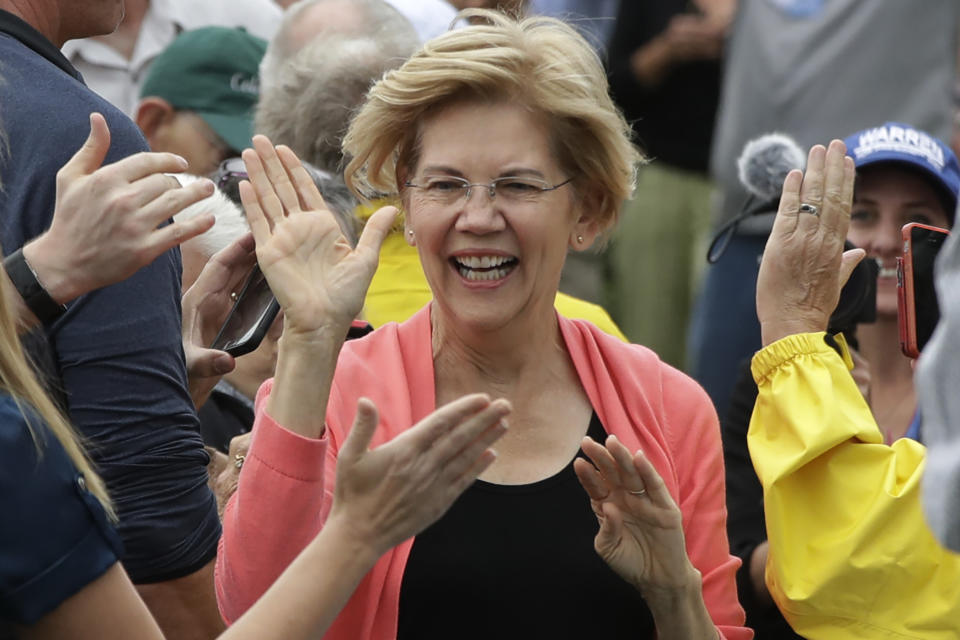The rich should get ready for Elizabeth Warren’s wealth tax
There are serious problems with the “wealth tax” on millionaires and billionaires that Sen. Elizabeth Warren says would raise nearly $3 trillion.
Since the tax would target wealth rather than income, the government would have to value the assets of wealthy households. Fudging and cheating would be rampant. There are also legal problems with a wealth tax, which may violate an arguably outdated clause in the U.S. Constitution.
Still, it could happen. Uncle Sam is running alarming, trillion-dollar deficits that at some point could necessitate large new sources of revenue. A wealth tax would do the trick. If Democrats take control of the government in the 2020 elections—including the Senate—they’ll need new funding sources for expensive new programs they plan to roll out. And Congress could probably write a law able to withstand court challenges to the constitutionality of a wealth tax.
But the strongest case for a wealth tax would come when the next recession strikes. America’s aristocrats have been doing great, enjoying the lion’s share of stock-market gains during an 11-year bull rally and capturing a record share of the nation’s overall wealth. The middle class, by contrast, has eked out modest gains, at best. Recessions always hurt lower-income workers the most, and the next one could generate unstoppable political pressure to rectify the growing gap between the rich and the rest.
Bulk of wealth comes from investments, business income
Warren’s wealth tax would impose an annual 2% surtax on wealth above $50 million, and a 3% surtax on wealth above $1 billion. There would be problems valuing the assets of the wealthy, which typically include privately owned business, real estate, art and other illiquid assets that don’t have an obvious market price. But Switzerland, Spain, France and Norway have figured out how to do it. Economists Emmanuel Saez and Gabriel Zucman of the University of California at Berkeley estimate this tax would raise $275 billion per year. Warren would use the money to cover a student debt payoff, free college for many students, universal child care and other new programs.
Simply raising the top income-tax rate might be a more straightforward way to raise revenue, and there are no questions about its legality. But Warren favors a wealth tax because the wealthy don’t actually earn all that much from ordinary labor at a job. Households with incomes above $53 million earned just 10% of that money from labor, according to research by Lily Batchelder and David Kamin of New York University School of Law. The other 90% comes from capital gains, dividends and business income. So most of that income is taxed under capital gains and business rates that are lower than taxes on income. Ordinary workers, by contrast, earn little of their income from investments taxed at the lower rates.

Since a wealth tax is a tax only the wealth would pay, it would rectify inequalities in the tax code, if you believe there are inequalities. And you could set the threshold lower than $50 million if you wanted to raise more revenue. There’s about $11 trillion of wealth in households above the $50 million threshold, but $21 trillion of wealth if you lower the threshold to $10 million. So there’d be more wealth to tax, and therefore more revenue to obtain.
Saez and Zucman estimated how a Warren-style wealth tax would affect some well-known billionaires if it had been in place since 1982. Jeff Bezos’s net worth would have dropped from $160 billion without the wealth tax to $87 billion with it. Mark Zuckerberg’s wealth would have dropped from $61 billion to $44 billion. Warren Buffett would take a bigger hit because he’s older and would have been subject to the annual wealth tax for longer. His net worth would have dropped from $88 billion to $30 billion. It’s hard to argue the megarich would suffer even if their net worth were cut in half.
It’s another matter to say the government would better spend the billions a wealth tax might generate than the wealthy people who’d be paying the tax. For all the yachts and cars they might own, the wealthy have most of their money in private-sector investments that generate economic activity. “The vast majority of Jeff Bezos’ wealth is being productively used,” says economist Donald Boudreaux of George Mason University. “At best you’d be taking from one investment to use for another investment. I don’t know that I’d trust the government to know how to use those resources better than individuals.” Plus, Bezos would still be able to buy as many yachts as he wants.
Rick Newman is the author of four books, including “Rebounders: How Winners Pivot from Setback to Success.” Follow him on Twitter: @rickjnewman
Confidential tip line: rickjnewman@yahoo.com. Encrypted communication available. Click here to get Rick’s stories by email.
Read more:
Trump’s trade war has killed 300,000 jobs
Trump’s wacky plan for the federal debt
Democrats are attacking the wrong companies
Trump’s biggest gamble yet: tax hikes before an election
Obama was better for your 401(k) than Trump has been
Read the latest financial and business news from Yahoo Finance
Follow Yahoo Finance on Twitter, Facebook, Instagram, Flipboard, SmartNews, LinkedIn, YouTube, and reddit.

 Yahoo Finance
Yahoo Finance 

